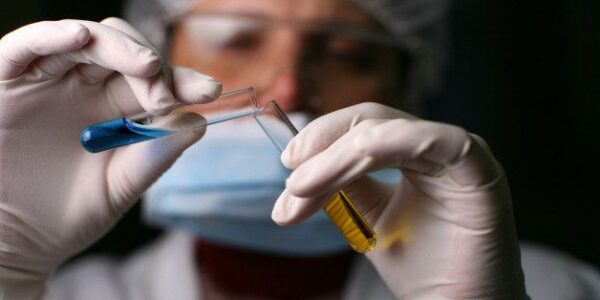
Where Do My Donations to Cancer Research Really Go?

Current cancer research is something that’s largely misunderstood. As this horrendous illness hangs like a black cloud over millions of people’s lives, the work that’s being done behind the scenes is often underestimated. People want to know why we haven’t got cures now – how long will it be? What’s really being done?
There are very real people working tirelessly behind the scenes to understand cancer. These researchers have families, children, partners, and hobbies like the rest of us, whilst dedicating their lives to this cause. Oxana Polyakova and Mariia Yuneva are just two of the incredible experts overseeing this vital research.

Oxana is Chief Scientific Officer at LlfT Biosciences and a researcher at the centre of Stars of Cancer, an upcoming feature documentary that will show the world who these scientists really are. Meanwhile, Mariia Yuneva works for The Francis Crick Institute and is currently researching how cancer cells metabolise nutrients in order to establish effective therapies for hard tumours.
Here’s what they want you to know about where cancer donations really go:
Oxana says: ‘There are lots of different ways researchers receive funding. My team’s work is largely supported by angel investors and venture capitalists, but we also apply for grants.
‘At ‘LIfT Biosciences’ we have developed a new type of cell therapy which kills cancer cells, mobilises, and activates the patient’s own immune cells, and changes tumours from the inside, making them defenceless against the patient’s immune system. We are now talking to venture capital firms and other organisations to raise funds that’ll help progress this research into first-in-human clinical trials next year.’
Mariia adds: ‘I oversee academic research. We look to figure out what’s going on in cancer cells and how they interact with other cells in a body, then researchers like Oxana then step in to work on creating a treatment.
‘My research is mostly funded by charities like Cancer Research UK and government bodies like the Medical Research Council. So, when you donate to these charities, your money helps my team tremendously and we (amongst many others) figure out how cancer cells grow, spread, and how we can stop them. That’s the only way we can hope to find life-saving cures.
‘My team are currently investigating what nutrients different types of cancer cells use to grow inside the body and avoid the immune system. We have found that cancer cells rely on the same nutrients as our healthy cells to thrive; so, they compete with them to survive. For example, we have seen that nutrients such as glutamine and vitamin B5, which are found in lots of common household foods, are essential for tumour cell growth and proliferation.
‘Experts have found ways to cut off cancer cells’ pathways to nutrients. However, we’ve seen that cancer cells then evolve and find other ways to source what they need – they adapt and shift to survive. Thankfully, my team and I have found efficient ways to block the cells and these approaches are now at the core of promising clinical trials. If you deprive cancer cells at their source, you can slow down the growth of tumours, so this really is promising research.’
Both Oxana and Mariia agree; if anything is misunderstood about cancer research and the pace of progress, it’s the exponential costs scientists face behind the scenes.
Mariia continues: ‘When my team and I apply for a grant (which typically lasts 1-5 years), we’re only one of many groups looking to secure funding.
‘There have been tremendous breakthroughs in cancer treatments, including immunotherapy, which has saved so many lives, but a lot more needs to be done and discovered. We are becoming more aware, and modern technologies help us answer complex questions, but people would be shocked by how much this equipment and overall process costs. A grant lasting 5 years typically costs around £2M, and that’s before a clinical trial even begins.’
Oxana adds: ‘Academic research is then translated into a drug discovery program by a team like mine to create new therapies. The average cost of developing a new drug and bringing it to market is estimated to be between $1-1.5B and could take 10 to 15 years.
‘We have capacity now to collect enormous amounts of valuable data from human samples that are fundamental for uncovering how tumour cells function and survive in a human body. However, fresh tumour samples can only live outside of the body for a matter of hours, meaning we have an incredibly short window to conduct our research. Getting any kind of sample from a patient costs between £2-5K, and I need to work on thousands of samples to really understand what’s going on, obtain reliable data, and create a treatment that can really make a difference.
‘That’s the reality; the work we do is expensive and finding funding isn’t always easy. Researchers need consistent financial support to make progress and as donations have been dipping recently, the whole industry is facing difficulties. Honestly, every pound donated helps.’
Given the sheer scale of researchers’ work, these scientists dedicate their lives to understanding and tackling cancer whilst facing immense pressure and leading lives of their own. That’s why Stars of Cancer, an exciting documentary created by Hollywood filmmakers, is looking to shine a brand-new light on their lives. By showing who these people really are and how their time is spent, the team behind this project are hoping to transform how the public views researchers and, in turn, inspire people to donate.
Sam Beckinsale is set to front this film, approaching the project as a woman in her 50’s, who, like many others, feels the word ‘cancer’ looms over her. Meanwhile, Sue Bradbear, a costume designer who’s worked on films including Star Wars and Harry Potter, is also joining the project to ensure it celebrates these scientists and the many exceptional women who front vital work.
Oxana and Mariia hope the public will come to better understand the work that’s being done and, with that, continue to support the vital inroads they’re making.












































